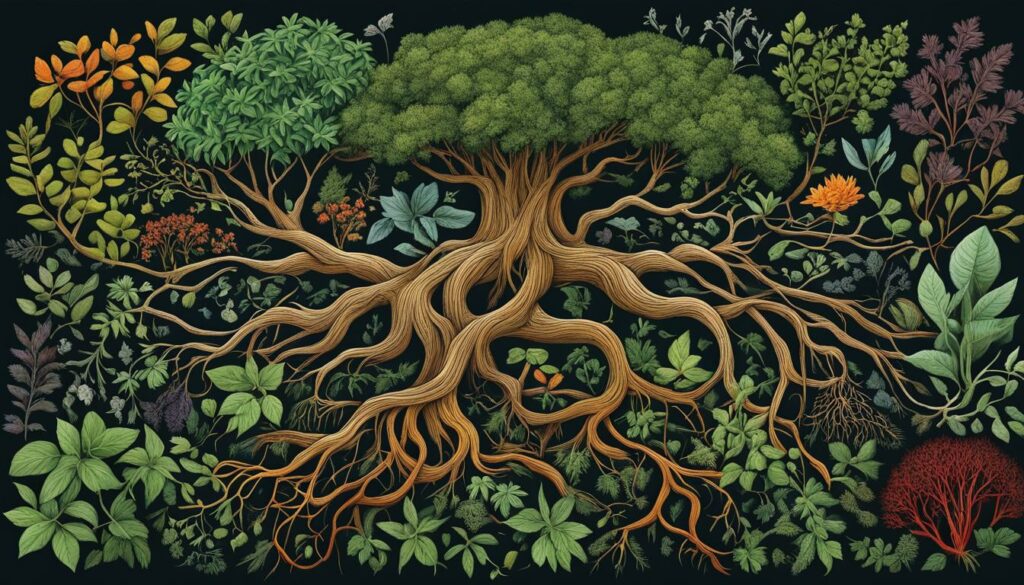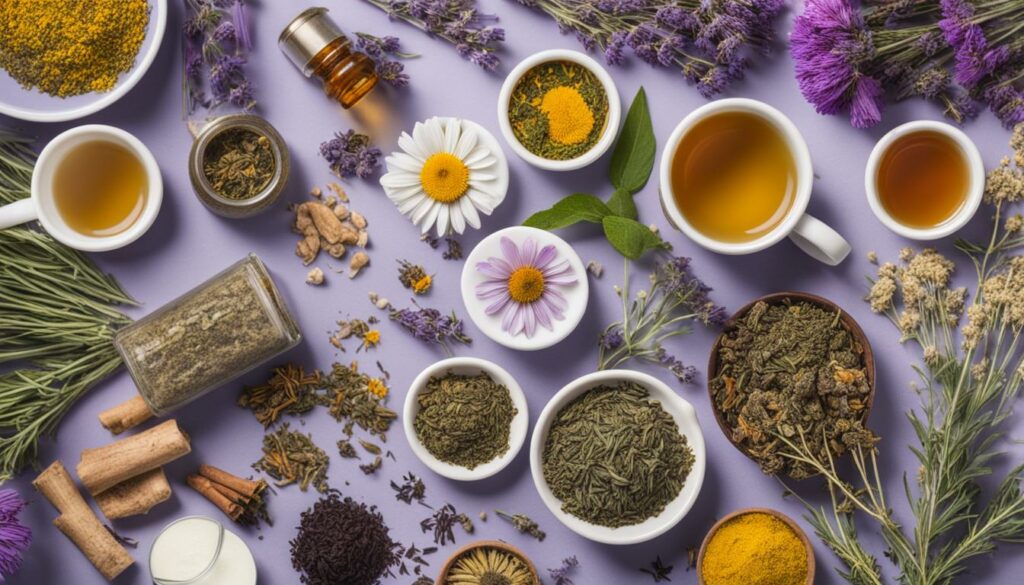Welcome to the world of herbalism, where nature’s healing powers come to life. If you’ve ever been curious about herbal remedies, herbal medicine, and the practices of traditional herbalism, you’re in the right place. Herbalism, also known as herbal medicine or phytotherapy, is the art of harnessing the therapeutic properties of plants for natural healing. Imagine the wisdom of ancient civilizations combined with modern scientific research, all focused on promoting your health and well-being.
Herbalism is not just a trend; it’s a time-honored tradition that has been passed down through generations. From the wisdom of ancient Egyptians, Chinese, and Indian cultures to the acceptance of herbal medicine in today’s world, the roots of herbalism run deep. These plants have been used for thousands of years to support our bodies’ natural healing processes.
So why do people turn to herbalism? The benefits are numerous. Herbal remedies provide a holistic approach to healing, addressing not only physical but also mental and emotional aspects of well-being. Whether you’re looking for preventive health measures or seeking relief from specific ailments, herbalism offers a natural solution.
In the following sections, we will dive deeper into the principles and practices of herbalism, the intersection of tradition and science, the versatile forms of herbal remedies, and how professional herbalists can guide you on your journey. It’s time to explore the wonders of herbal medicine and discover the transformative power of nature.
The Roots of Herbal Medicine
Herbal medicine has a rich history that dates back to ancient civilizations such as Egypt, China, and India. These cultures relied on plants and their extracts for healing purposes and documented their knowledge in texts and manuscripts.

“The use of plants in medicine is as old as human civilization itself.”
Tracing Back the Ancient Practices:
- Ancient Egyptians recognized the medicinal properties of plants and developed extensive herbal remedies. They documented their knowledge in texts such as the Ebers Papyrus, which contains remedies for various ailments.
- Ancient Chinese medicine, rooted in the philosophy of yin and yang, utilized herbal remedies to restore balance and promote overall well-being. The earliest known Chinese herbal manual, the Shen Nong Ben Cao Jing, classified hundreds of medicinal plants.
- Ayurveda, an ancient Indian system of medicine, incorporated herbal remedies into its holistic approach to health. The Ayurvedic texts, including the Charaka Samhita and Sushruta Samhita, detailed the properties and uses of numerous medicinal plants.
From Traditional Systems to Modern Acceptance:
- Traditional medicine systems around the world preserved the knowledge of herbal medicine throughout history. These practices were passed down through generations, with practitioners refining their understanding of plant-based remedies.
- In recent years, there has been a resurgence of interest in herbal medicine, leading to its growing acceptance in modern society. The recognition of the therapeutic potential of plant-based remedies has prompted scientific research and clinical studies to further explore their efficacy and safety.
The Transformation of Herbal Remedies Over Centuries:
- Over the centuries, the practice of herbal medicine has evolved to incorporate both traditional wisdom and modern scientific knowledge. Traditional herbal remedies have been studied and refined, adapting to the changing healthcare landscape.
- In the evolution of herbal remedies, new discoveries and scientific advancements have allowed for a deeper understanding of the chemical composition and pharmacological properties of medicinal plants.
- With advancements in technology and globalization, herbal medicine is now more accessible than ever. It has gained recognition as a valid form of healthcare, complementing conventional medicine and offering a natural and holistic approach to healing.
Understanding Herbalism Practices Today
Herbalism today encompasses a range of practices and approaches to healing. Herbalists are practitioners who utilize plants and their extracts to support health and well-being. They take a holistic approach to healing, considering the whole person, including physical, mental, and emotional aspects.
Herbalism practices focus on the idea that the body has an innate ability to heal itself and that herbs can assist in this process. The use of personalized treatments is central to herbalism, as each individual is unique and requires tailored care. Herbal consultations with experienced herbalists allow for a thorough understanding of the individual’s health history, lifestyle, and specific concerns, which helps in creating personalized treatment plans.

By taking a holistic approach, herbalists aim to address the root causes of health imbalances, rather than simply alleviating symptoms. They recognize the interconnectedness of various body systems and work to restore balance and promote overall well-being.
Herbalism practices are grounded in the knowledge and experience passed down through generations and are supported by ongoing scientific research. This combination of tradition and modern understanding allows herbalists to provide evidence-based recommendations and guidance.
Whether you are seeking preventive care, looking for natural remedies, or dealing with specific ailments, herbalism practices offer a gentle and personalized approach to healing. With a focus on the individual and their unique needs, herbalists can provide guidance on incorporating herbal remedies into your daily life.
What is Herbalism?
A Definition of Herbalism
Herbalism can be defined as the practice of using plants and their extracts for medicinal purposes. It is a form of natural healing that prioritizes the use of plant-based remedies to support the body’s innate healing processes.
Key Principles in Herbal Medicine
Herbal medicine operates on several key principles that guide its approach to healing:
- Holistic Approach: Herbalism embraces a holistic approach to healing, considering the interconnectedness of the body, mind, and spirit. It recognizes that true health goes beyond the absence of symptoms and aims to restore overall balance and well-being.
- Plant-based Remedies: Herbal medicine relies on the healing properties of plants, utilizing their leaves, flowers, roots, and other parts to create remedies. These natural substances contain active compounds that can promote health and support the body’s healing processes.
- Individualized Treatment: Herbalists take into account each individual’s unique constitution, lifestyle, and health history. They tailor herbal treatments to address specific needs, recognizing that what works for one person may not work for another.
- Traditional Wisdom: Herbal medicine draws upon the knowledge and wisdom passed down through generations. It incorporates traditional practices and remedies that have stood the test of time.
- Evidence-based Practices: While honoring tradition, herbal medicine also embraces scientific research and evidence. It seeks to integrate traditional knowledge with modern scientific findings to ensure safe and effective treatments.

| Principle | Explanation |
|---|---|
| Holistic Approach | Recognizes the interconnectedness of the body, mind, and spirit in promoting overall health and well-being. |
| Plant-based Remedies | Relies on the healing properties of plants to create natural remedies for various health conditions. |
| Individualized Treatment | Tailors herbal treatments to address the unique needs and constitution of each individual. |
| Traditional Wisdom | Incorporates knowledge and practices passed down through generations to inform herbal treatment approaches. |
| Evidence-based Practices | Integrates traditional knowledge with modern scientific research to ensure safe and effective herbal treatments. |
The Intersection of Science and Tradition
In recent years, there has been an increasing interest in the intersection of science and tradition in herbal medicine. This convergence has allowed for evidence-based herbalism, where traditional knowledge meets scientific research to explore the efficacy and safety of herbal remedies through rigorous clinical studies. By combining centuries of traditional wisdom with modern scientific methods, evidence-based herbalism aims to provide a deeper understanding of the healing properties of plants and their potential applications in healthcare.

Exploring the Benefits of Herbalism
Herbalism in Preventive Health
One of the key benefits of herbalism is its potential role in preventive health. Herbal remedies and practices can be used to support and maintain overall wellness, boost the immune system, and promote longevity.

Herbal teas, tonics, and dietary supplements can provide nourishment and support the body’s natural defense mechanisms. By incorporating herbalism into your daily routine, you can take proactive steps towards optimizing your health and well-being.
Targeting Ailments with Herbal Therapies
Herbalism offers a holistic approach to targeting specific ailments and health conditions. Through extensive research and traditional knowledge, herbal remedies have been developed to address a wide range of physical and mental health issues.
Whether you’re experiencing digestive problems, insomnia, anxiety, or skin conditions, there are herbal therapies available that can help alleviate symptoms and promote healing. Herbal remedies are often personalized to suit individual needs, ensuring a targeted and effective approach to treatment.
Herbal Supplements and Efficacy
In addition to herbal remedies, herbal supplements have gained popularity for their potential health benefits. These supplements contain concentrated forms of specific herbs and can provide a convenient and effective way to incorporate herbalism into your daily routine.
The efficacy of herbal medicine has been studied extensively, and many herbs have shown promising results in addressing various health conditions. However, it’s important to note that herbal supplements should be used under the guidance of a healthcare professional or a qualified herbalist to ensure safety and proper dosage.
| Benefits of Herbalism | Preventive Health | Targeting Ailments | Herbal Supplements |
|---|---|---|---|
| Supports overall wellness | Boosts the immune system | Addresses specific health conditions | Convenient and effective |
| Promotes longevity | Personalized treatment | Alleviates symptoms | Requires professional guidance |
| Nourishes the body | Supports natural defense mechanisms | Promotes healing |
By exploring the benefits of herbalism, you can unlock the natural healing potential of plants and embrace a holistic approach to health and wellness.
Making Use of Herbal Remedies: Forms and Functions
In the world of herbal medicine, there are various forms of herbal preparations available to support health and well-being. Understanding these different forms, their benefits, and how to administer them is essential in harnessing the full potential of herbal remedies. Additionally, seeking guidance from professional herbalists ensures the safe and effective use of herbal medicine. Let’s delve into these aspects in more detail.
The Various Forms of Herbal Medicine
Herbal medicine offers a wide range of forms through which the healing properties of plants can be utilized. These forms include:
- Teas: Herbal teas are a popular and accessible way to enjoy the benefits of herbal medicine. By steeping herbs in hot water, the beneficial compounds are extracted, creating a flavorful and medicinal beverage.
- Tinctures: Tinctures are alcohol-based extracts that preserve the active constituents of herbs. They are convenient to use, as only a few drops are needed, making them suitable for situations where precise dosages are required.
- Capsules: Herbal capsules offer a convenient way to incorporate herbal medicine into a daily routine. They contain powdered herbs in a capsule form, making them easy to swallow and ensuring accurate dosages.
- Creams and Ointments: Herbal creams and ointments are topical preparations that allow for direct application to the skin. They are often used for skincare purposes, providing nourishment and addressing specific skin concerns.
Each form of herbal medicine has its own benefits and functions. It is important to consider the specific condition, desired outcome, and individual preferences when choosing the appropriate form of herbal remedy.
Understanding Dosages and Administration
When using herbal remedies, it is crucial to follow proper dosages and administration guidelines to ensure their effectiveness and safety. Dosages can vary depending on factors such as age, weight, and the severity of the condition being treated.
Professional herbalists can provide personalized recommendations on dosages and administration, taking into account individual needs and any potential interactions with medications or existing health conditions. Their expertise ensures that herbal remedies are used in the most effective and appropriate manner.
Seeking Guidance from Professional Herbalists
When incorporating herbal medicine into your wellness routine, it is valuable to seek guidance from professional herbalists. These practitioners have extensive knowledge of herbs and their applications, offering personalized consultations and recommendations.
Professional herbalists can assist in selecting the most suitable herbal remedies based on individual needs, provide guidance on dosages and administration, and offer valuable insights into potential herb-drug interactions. They are an essential resource for maximizing the benefits of herbal medicine while ensuring safety and efficacy.

In summary, herbal medicine presents a wide range of forms and functions, offering diverse ways to incorporate the healing power of plants into your wellness routine. By understanding the various forms of herbal preparations, their dosages and administration, and seeking guidance from professional herbalists, you can confidently utilize herbal remedies to support your health and well-being.
Conclusion
Embracing Herbalism at Smoketree Apothecary allows you to tap into the power of nature for holistic wellness. Whether you’re curious about herbal medicine or looking to integrate it into your modern lifestyle, Smoketree Apothecary offers an array of high-quality herbal products and personalized consultations.
At Smoketree Apothecary, we believe in the transformative potential of herbal medicine. Our commitment to holistic wellness and sustainable practices ensures that you receive the highest quality herbal remedies. By embracing herbalism, you can embark on a journey of self-care and well-being, nurturing your body and mind with the healing power of plants.
Integrating herbal medicine into your modern lifestyle is easier than ever with the expertise and guidance of our dedicated team at Smoketree Apothecary. Our personalized consultations allow us to tailor herbal remedies to your unique needs, addressing specific health concerns and helping you achieve optimal wellness.
FAQ
What is herbalism?
Herbalism, also known as herbal medicine or phytotherapy, is the practice of using plants and their extracts for medicinal purposes. It is a form of natural healing that prioritizes the use of plant-based remedies to support the body’s innate healing processes.
What are the benefits of herbalism?
Herbalism offers a natural and holistic approach to healing, utilizing the power of nature to support the body’s own healing processes. It can be used for preventive health, boosting the immune system, and promoting overall wellness. Herbal remedies can target specific ailments and provide relief, and herbal supplements can be used to support various aspects of health.
How does herbalism differ from conventional medicine?
Herbalism takes a holistic approach to healing, considering the whole person rather than just addressing specific symptoms. It focuses on natural remedies derived from plants, while conventional medicine often relies on synthetic compounds. Additionally, herbalism often emphasizes preventive health and supporting the body’s innate healing processes.
Is herbalism based on scientific evidence?
In recent years, there has been a growing interest in integrating traditional knowledge of herbal medicine with scientific research. This intersection allows for evidence-based herbalism, where the efficacy and safety of herbal remedies are explored through rigorous clinical studies. However, it is important to note that not all herbal remedies have undergone extensive scientific research.
What are the different forms of herbal medicine?
Herbal medicine comes in various forms, including teas, tinctures, capsules, creams, and ointments. Each form has its unique benefits and functions, and the choice of form depends on the specific condition and individual preferences.
Is it safe to self-administer herbal remedies?
While many herbal remedies are generally safe when used properly, it is important to exercise caution and seek guidance from professional herbalists. They can provide personalized advice based on your specific health needs and help you choose the right herbal remedies and dosages.
How can I find a professional herbalist?
If you’re interested in seeking guidance from a professional herbalist, you can look for reputable herbalist associations or organizations in your area. They often have directories of qualified herbalists who can provide consultations and personalized treatment plans.
Source Links
- https://www.mountsinai.org/health-library/treatment/herbal-medicine
- https://www.webmd.com/a-to-z-guides/what-is-an-herbalist
- https://en.wikipedia.org/wiki/Herbal_medicine

